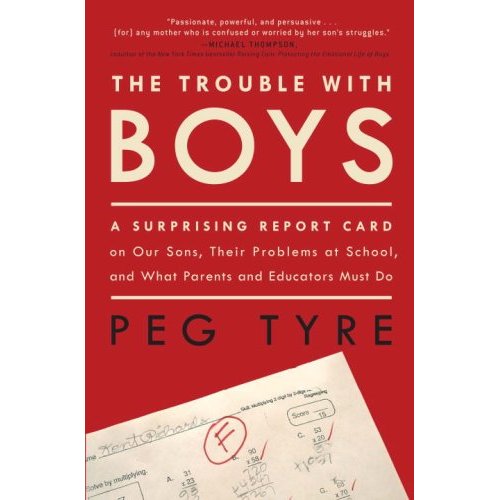We've all heard the argument repeated by pundits and politicians in the post-Columbine era: teens who play violent video games are at an extreme risk of being corrupted by the violent media they're exposed to. It's a theory that certainly seems to resonate with concerned parents in particular. After all, no one wants to knowingly endanger their child's mental well-being, especially with something that seems like an innocent pastime. But in an argument that will probably make game critics' heads explode, a new book believes that young boys who are struggling in school may need more exposure to violent media in order to do better. The author of The Trouble With Boys, Peg Tyre, claims that the recent anti-violence efforts of the past decade are actually doing more to hinder boys' development than help them.
Tyre's suggestion is simple enough: let boys be boys by simply letting them engage in the aggressive fantasies that come to them naturally.
The idea for the book began when Tyre, a senior writer for Newsweek at the time, wrote a 2006 cover story for the magazine, called "Boy Crisis." The article focused on how boys were falling behind in school and what educational institutions were doing to address the issue. The figures are certainly worrying, according to Tyre: "Boys get expelled from preschool at four times the rates of girls," she writes. "They are prescribed the lion's share of ADHD medication, they get most of the C's and D's in middle school, and they drop out of high school more than girls. Currently, only 43% of undergraduates in the United States are men." So what's the solution? Tyre's suggestion is simple enough: let boys be boys by simply letting them engage in the aggressive fantasies that come to them naturally.

It's a unique perspective, to be sure, and one that will definitely make readers sit up and take notice, since it seems so diametrically opposed to conventional wisdom. When you stop to think about it, though, Tyre's argument seems to make a fair amount of sense. If you've been around schools or youth organizations recently, you've probably seen how even playfully aggressive behavior is often demonized by both parents and other adults. A case in point from my own experience: when I served as an assistant scoutmaster for my Boy Scout troop at a summer camp in 2003, a number of parents complained about the fact that the Rifle and Shotgun Shooting merit badges were available as part of the camp's curriculum. They believed that teaching teenage boys the standard safety, care, and operation of firearms was wrong.
Five years earlier, such complaints were unheard of, even in a suburb directly over the hill from Berkeley. This attitude, though, seems to have permeated the entire country.
Tyre stresses that many boys relate to violence no matter what their background is. "It doesn't matter whether Mormons in Utah or lesbians in Cambridge are raising boys. Many of them play and think around violence," Tyre said during a recent talk with a group of parents in North Salem, NY. "We might see them as doing something potentially dangerous. But actually what they're doing is playing around with ideas of courage and valor, good versus evil, and teamwork. These are ideas we want to inculcate in our culture."
Tyre believes that this anti-violence paranoia really started to spring up in the mid-to-late 1990s, when a number of high-profile school shootings received so much media attention that it overwhelmed common sense. "There was such media saturation about [events like Columbine] that it seemed to people that it was happening in their communities next door, [and] it created a zero tolerance policy towards violence," she told Ars. "These morphed into a zero-tolerance policy towards aggression. That sounds good in theory, but it sometimes means that things like running and playing 'Tag' on the playground are discouraged."
As a result, "we're in this place—as a culture—where smart, right-thinking parents discourage their sons from violence," Tyre said. "It's perfectly normal for little boys to think and talk around violence; it doesn't mean they're going to be violent."
reader comments
85